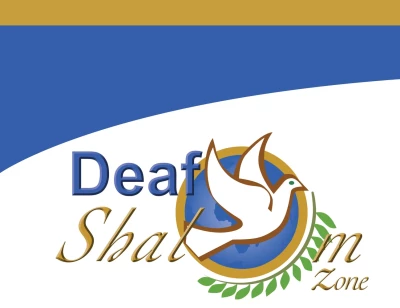Deaf Shalom Zone to celebrate 25 years of ministry, service to the Deaf community
By Zamone "Z" Perez, Public News Service
 Kathi Jeffra is not Deaf or Hard-of-Hearing. In fact, she had no connections to the Deaf community whatsoever.
Kathi Jeffra is not Deaf or Hard-of-Hearing. In fact, she had no connections to the Deaf community whatsoever.
Her introduction to Deaf culture and language began with a book of hand signs. She used the signs in her Head Start classes for lining up, brushing teeth, sitting down and more. She used signs in class so kids who had no experience with the Deaf community could at least see people using American Sign Language to communicate.
She then started following along with the interpreter at her local Catholic church, eventually agreeing to sign the communion hymn to give the interpreter a break during services. A couple that attended both Catholic and United Methodist church services invited her to a Deaf UMC church, and eventually, she was asked to work for a summer as a secretary at the church. That decision would lead her on a path to more than a decade of work in Deaf ministries at Deaf Shalom Zone.
“One thing led to another, and summer led to fall and winter,” Jeffra said. “Then I was just on board. By that time, I was learning from the community, and that’s the best way to learn language. You learn, not just lists of words, but authentic communication.”
For 25 years, Deaf Shalom Zone has served the Deaf and Deaf-Blind community in Maryland, empowering individuals to greater equity, access and independence. The ministry will host a gala on May 31.
Deaf Shalom Zone uses the C.A.R.E model in its ministry: Case Management, Advocacy, Referral and Education. That model encompasses a long list of services and assistance for members of the Deaf community.
The ministry helps Deaf individuals “discern what it is that they need to improve their life and helping them access those services,” Jeffra explained. That could mean helping a church member that’s Deaf be able to translate words from a hymn, or helping Deaf people with literacy assistance. American Sign Language, Jeffra notes, is “not even loosely” based on English.
Deaf Shalom Zone serves church members and non-church members alike.
Advocacy includes educating employers about legal requirements to provide equal access and accommodations, along with connecting Deaf individuals with government and non-profit resources for employment, transportation, education, food, nutrition and more.
Deaf Shalom Zone also educates the hearing community, bringing American Sign Language students in to volunteer at the ministry. That way, the Deaf community plays an active role in preparing the next generation of social service professionals.
Ministries to the Deaf community operate as many Deaf people remain wary of religion, and Christianity in particular.
Rev. Kirk Van Gilder, a professor of religion at Gallaudet University, said there has historically been a certain level of distrust between members of the Deaf community and Christianity. Interpretations of the Bible that emphasize a need to be healed from — or sin as a cause of — Deafness, he explained, often created barriers and distrust within the community.
Deaf ministries, he added, are often seen as extras, rather than necessities, at predominantly hearing churches.
“In many cases, Deaf ministry, whether in supporting an independent Deaf led church through connectional funds or supporting inclusive worship and discipleship opportunities in a hearing church, is seen as an 'expense' that is expendable when money gets tight,” Van Gilder said. “This overlooks the very long road of repentance and reconciliation needed by hearing churches as well as learning and unpacking the biases hearing people have toward Deaf people.”
The data sheds light on such barriers. According to Silent Blessings Deaf Ministries, less than five percent of churches in the United States have Deaf ministries, and even fewer have ministries that are age-appropriate. The Deaf community is the largest unreached people group in North America, with only two to four percent of Deaf individuals identifying as Christian.
Deaf ministries are changing, too, Jeffra explained that Deaf ministries are moving in a new, more inclusive direction. The focus has shifted from doing tasks for a Deaf person to empowering Deaf people to be as independent as possible.
“Our emphasis has shifted, and now we do a lot of mobility applications,” Jeffra said. “‘Oh, you need to get to the doctor, and you need to get your job and you need to get to Walmart, so let's get you hooked up with mobility so that the bus can come and pick you up at your house.’”
“We're empowering them. We're teaching them to self-advocate, for the Deaf person to explain to the dentist how to get an interpreter and who to call for that. So that's the flip,” she added.
Deaf Shalom Zone will host a gala celebrating 25 years of ministry on Saturday, May 31, in Baltimore. People interested in attending the gala can buy tickets for $25 online or in person at the event.
